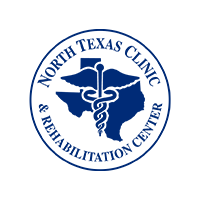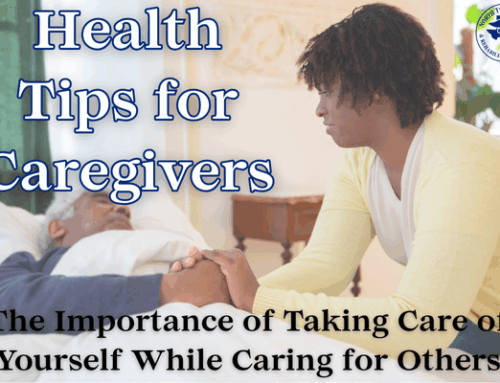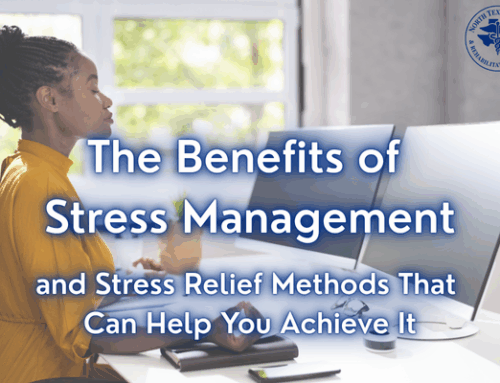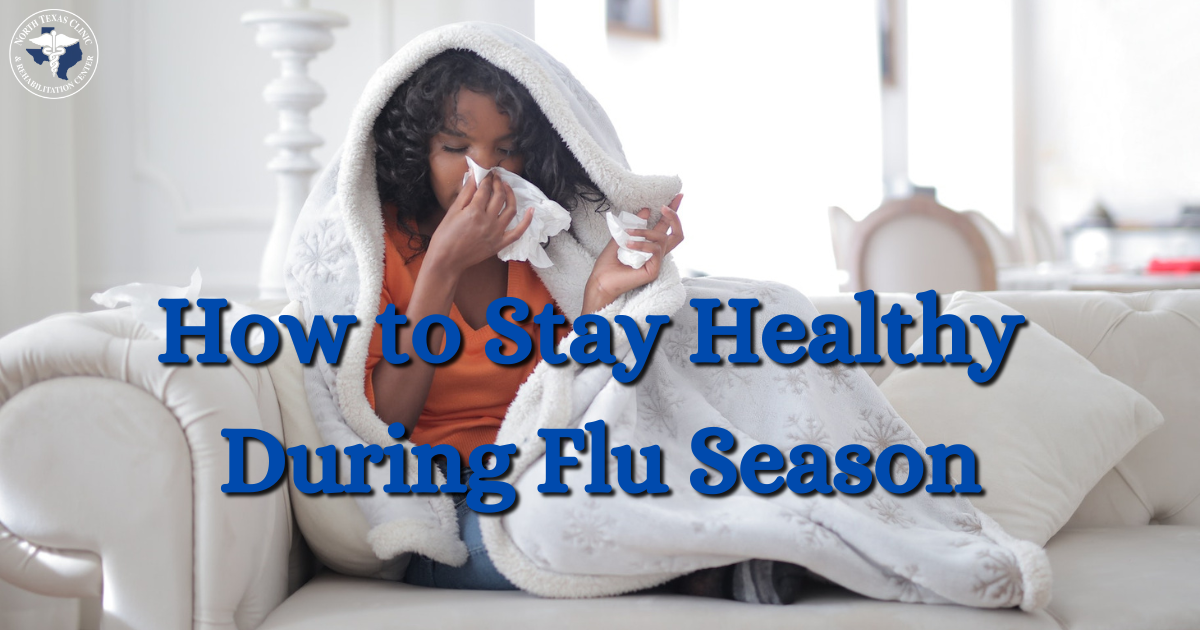
Yes, it’s here. Every fall, we have to worry about how to stay healthy during flu season. While we prepare for the holidays and wrap up the year, we are also most at risk of getting sick.
Flu season starts in the fall and lasts throughout the winter. While strains of the flu can circulate any time of the year, this is when it’s most prevalent.
Getting a vaccine is your first line of defense against the flu.
Unfortunately, it’s not always 100% effective. Even with a flu shot, you might still get sick due to a difference in that year’s strain versus what’s in the vaccine. Plus, some people can’t get it due to age, allergies, or health conditions.
So, knowing how to stay healthy during flu season is essential.
Strengthen Your Immune System
Your immune system attacks invaders (like viruses and bacteria) that can make you sick.
As long as you eat a balanced diet and maintain your health, your immune system will do its job.
However, colder weather and the holiday season can disrupt your typically healthy lifestyle. You might not exercise as much due to the lower temperatures. And with increased social gatherings, you may eat less healthy foods or drink more alcohol than usual.
Furthermore, the holidays and year’s end cause stress for many people. Unfortunately, stress weakens your immune system.
Luckily, there are many immunity-boosting foods you can eat, many of which are found in popular holiday dishes. Foods like cranberries, sweet potatoes, turkey, greens, and pumpkin have a huge amount of vitamins and minerals to help keep your immune system strong.
In addition to eating well, you can help your body defend against the flu with regular movement and exercise, getting good sleep, and finding stress-reducing activities.
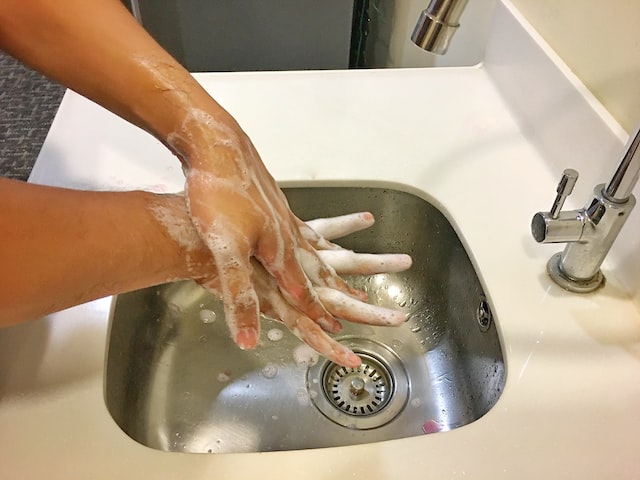
One of the best ways to stay healthy during flu season is to wash your hands. Image source
Wash Your Hands
The importance of washing your hands wasn’t new with the pandemic; we just didn’t think about it as much.
However, it’s always been one of the most effective ways to keep from getting sick.
Thorough hand washing doesn’t just prevent the flu; it protects you from stomach viruses, other contagious illnesses, and even parasites.
Simply rinsing or quickly washing your hands isn’t enough, though. Water alone won’t rid your hands of germs, and too quick of a wash won’t do the trick either.
- Always follow these handwashing steps:
- Wet your hands under running water.
- Apply enough soap to cover your hands and wrists completely.
- Form a lather and then scrub your hands and wrists for at least 20 seconds. Don’t forget about the space between your fingers and under your fingernails!
- Rinse your hands thoroughly under running water.
- Dry hands with a clean towel or allow them to air dry.
- Try to avoid touching the faucet and doorknob with your clean hands, especially in public places.
It’s also a good idea to keep hand sanitizer in your bag or car. While it’s not as effective as washing with soap and water, it’s much better than nothing.
Wash your hands after every trip to the bathroom (public or private), after you get home from a public place, after sneezing, coughing, or touching your eyes, and before you eat.
If you’ve become relaxed about your handwashing frequency, it’s time to step it back up to help you stay healthy during flu season.
Masking and Social Distancing
We get it; everybody is tired of wearing masks.
However, wearing a mask and social distancing is highly effective for staying safe from any contagious illness, not just COVID-19.
This Scientific American article highlights how sharply the cases of influenza dropped during the COVID-19 pandemic.
Part of that decline is likely due in part to the fact that we weren’t getting out nearly as much as we used to. But as we started going out more, the flu remained low. The reason is most likely because we were still wearing masks and staying six feet apart.
While it might not be something you want to do, masking up is still one of the best ways to protect yourself from contagious illnesses. It’s even more critical if you have a weakened immune system or live with somebody who does.
Even if you don’t wear a mask, social distancing also helps. You never know whether somebody has a contagious illness. They might not even know! So whenever possible, avoid close contact with strangers and people you know to be sick.
And be mindful of protecting others too! If you’re sick, please stay home whenever possible.
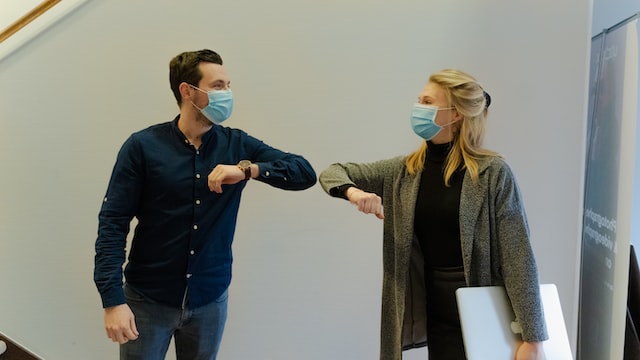
Masking and social distancing don’t just prevent the spread of COVID-19; it helps protect against the flu and other illnesses too. Image source
Know How to Stay Healthy During Flu Season
Getting the flu is awful, and the more you can do to avoid it, the better—especially since avoiding that means preventing other illnesses.
That’s right; it’s not just about the flu.
At the same time that this pesky virus is most common, other respiratory viruses are circulating, as well. These include Rhinovirus (a common cause of the cold), RSV (especially dangerous for babies and older adults), adenoviruses, and human coronavirus.
Knowing how to stay healthy during flu season protects against these viruses, as well as stomach illnesses and other infections. And they apply year-round, not just during the fall and winter.
When you take care of yourself, it often naturally leads to better health in general.
Again, the flu vaccine is the most effective defense against the flu. Everybody who can get it should strongly consider it.
But with or without a vaccine, eating a balanced diet, washing your hands, and wearing a mask provide significant protection and can help you stay healthy during flu season.
Top photo by Andrea Piacquadio on Pexels
